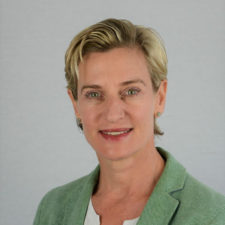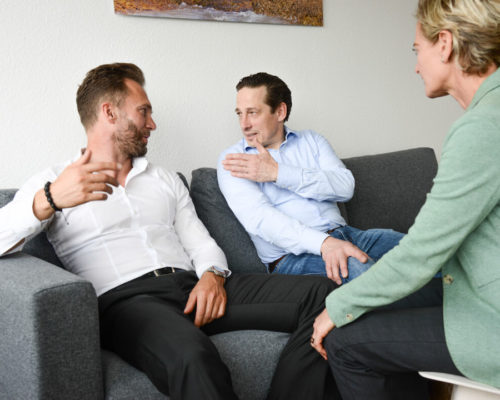Couples therapy in the Medical Care Center Cologne for Psychotherapy GmbH Odendahl & Kollegen
We offer you
- Professional consultants and therapists with several years of training in couple therapy
- Interdisciplinary team from psychology, pedagogy and business
- Couples therapy also in English
- High availability, same day response on weekdays
- Quick appointment allocation within 7 days, appointments at off-peak times and weekends possible
We always keep the process and duration transparent for you
- Costs of a session for a first consultation of 90 minutes: 170 € (plus VAT)
- Cost of each additional 90-minute session: 190 € (plus VAT)
- Recommended duration: is determined individually, usually about 6 – 10 sessions
- The first interview serves to get to know your relationship history and your everyday life. Certain main topics are focused on in order to be able to work through them in subsequent sessions. Interval and further appointments are discussed here.


Our couple therapists
Couples counselor Friederike Ludwig
Master of Counseling, systemic couple therapist, marriage, family and life counselor
Our philosophy
At MVZ Köln für Psychotherapie Odendahl & Kollegen you will find competent and professional help and support from specialized couple therapists and counselors – whether as a couple, parents (together or separated) or as an individual. Couples therapy is not only useful when a conflict or even crisis is already there.
Take advantage of our therapy offers such as couple coaching and uncover the potential of your partnership.
The core of our work is that our couple counselling should be one thing above all else for you: Profitable and insightful!
Couple therapy should enable both partners to take a look at your relationship with all its components, at wishes and goals that should make up your partnership – both your own and your partner’s. You will be amazed how much more you can learn and recognize about yourself and your partner in just a few hours.
Our couple consultants
Our multi-professional team at the MVZ Köln für Psychotherapie GmbH Odendahl & Kollegen consists of certified psychotherapists and certified psychologists as well as certified pedagogues. All couple counselors have many years of training and experience in systemic couple counseling.
Our psychological practice for couple therapy in the Südstadt of Cologne is centrally located and easily accessible by public transportation.
In our joint sessions of couple therapy
- learn more about your relationship
- above all, explore your own relationship patterns
- find out more about what you are looking for in relationships and how you behave in partnerships
- learn more about your own wishes and needs
- reflect and develop your personality
- we illuminate your personal life story
- learn to understand yourself and your partner better and to work together on a solution in critical situations
- even if the future as a couple should not be the right one for you, you will in any case be able to take new insights for your future with you through couple counselling.
Couples Intensive Training Weekend – Couples Therapy in Cologne – Get your relationship going.
More information about couple therapy: Phone +49 221 93297588 or mobile +49 174 3139636
Dates for a couple consultation in Cologne are also possible in the evening and on Saturdays!
Couples therapy Cologne – The way to our office
Our office is located in Cologne-Bayenthal. You can easily reach us by car or public transport from the different parts of Cologne – such as Sülz, Ehrenfeld, Nippes but also from Porz.
Couple Therapy Cologne: A happy partnership has no crises?
Wrong! Because a happy couple relationship only grows through the successful overcoming of crises!
A happy relationship is created by two partners who use their strengths to overcome difficulties.
Crises are signs of a living relationship – the art is to find solutions to these conflicts in order to create a sense of community and familiarity.
Paartherapie Köln: Why do relationship crises arise?
Crises often arise when conflicting needs meet.
These needs can be of very different nature, for example emotionally (one demands more closeness, the other wants more distance) or in sexuality (one partner or both are not satisfied sexually). It is important to understand that each person goes through different phases of life. Whereas independence and spontaneity used to be the main focus for us, security and stability may now become increasingly important.
The change in the needs of our partner can suddenly become a problem for us. This is where the Cologne Couples Counseling Service comes in. Both partners are supported in their individual development by a couple therapy. The goals and wishes of each partner are reflected and perceived anew by the other. The personal development of each partner becomes an enrichment of the marriage or partnership. Psychological counseling can create a new dynamic in the partnership. In the case of problems in sexuality, sexual therapy can provide clarity and open up new paths.
Couples therapy Cologne: How will your relationship be happy?
A happy couple relationship is not a state that exists or does not exist.
It is a dynamic process. And in a dynamic process, crises necessarily arise, which are a sign that your relationship is developing.
From crisis to happy partnership with a couple therapy
Couples counseling offers the optimal framework for you to increase the quality of your relationship as a couple and thereby gain valuable insights for your personal development. Rediscover yourself, your partner and the potential of your relationship and find a way out of the crisis.
Sexual therapy – case study
In order to give you an example of how erectile dysfunction can possibly develop in the course of a lifetime, we will explain this using a case study:
Peter is 52 years old, works in a law firm as a lawyer and is married in 2nd marriage. He pays off with his friendly nature, intelligence, diligence and conscientiousness. He was raised by one of his maternal aunts, because contact to his father after the divorce of his parents was always cut off after his birth (he never met him either) and his mother died when he was 8 years old. His mother, who worked many hours a day in a hotel in another city, came to visit him occasionally, but was rather distant and cool. When he visited her, she refused to let him spend the night with her, so he was forced to sleep at the youth center. Once, when he ran away from there because he wanted to go to his mother, he had to be tied up at night and from then on he was not allowed to visit his mother at all.
His aunt took over his custody after her death (cancer). Peter describes his adoptive mother as a “tyrant”. In the family he had no real caregiver. He never had the feeling of belonging properly, or felt like a burden. He could not confide his feelings and needs to anyone in the family. His strict aunt often behaved without distance, physical punishment was still part of the everyday life of his upbringing. He found physical touching unpleasant, almost disgusting. Sexuality was a taboo subject in the family, and was dismissed as sinful or dirty.
In his first relationship at the age of 17 with the same age Paula, with whom he was not particularly in love, there was no sexual intercourse because she did not want it that way. He separated from her at the age of 19. The following year he started a new relationship with Susanne. Peter was very much in love with Susanne, both had satisfying sex with each other. His girlfriend was still living in another city at the time, so they saw each other rather rarely or only on weekends. When she moved closer to him and he introduced her to her foster mother, his feelings quickly ebbed away, he retired, so that at the age of 23 they separated. The many short relationships that followed, including a marriage, were rather superficial or problematic and often ended in arguments. Peter often felt exploited and misunderstood.
The nevertheless persistent need for closeness and tenderness moved him to register in an online portal, through which he met his 2nd wife Sabine. He felt attracted by her positive nature and warming attention. The two quickly became closer, a satisfying sexual relationship grew into a weekend relationship. After about 10 months Sabine moved in with him. There was still sexual contact, but Peter Sabine’s needs often became too much. Humanly, the partnership went so well that they married after 2 years. Shortly after the wedding Peter developed erectile dysfunction, which got worse and worse over the next year.
Peter increasingly suffered from fear of failure and developed various avoidance behaviors by going to bed earlier, staying in the office longer until Sabine was already asleep or pretending to be too tired for sex. Despite various drugs from the pharmacy, the problem did not resolve itself. Sabine felt his rejection as a rejection towards her. She was afraid that she was no longer attractive enough for her husband, got a new hairstyle or bought provocative lingerie. Peter finally found any advances by his wife unbearable, because the fear that she wanted sex right away was always there. In addition, he also had a guilty conscience towards her, felt like a bad husband, a failure. In addition, he also suffers from the fact that his own still current sexual needs were not satisfied. Sabine suffers from the fact that she can’t arouse any excitement in him, despite various attempts, and doesn’t want him to feel bad about the failed attempts. She is open to new ideas and keeps asking about his needs, but he doesn’t tell her anything. Since meanwhile 2 years there was no more sexual intercourse, but a separation was never an option for both of them.
If you have had similar experiences, please do not hesitate to contact us. Help is coming!
Family therapy in Cologne
Mental suffering not only affects individuals – it also affects their marriages, relationships and entire families. Family therapy looks for the roots of the problem symptoms in the social environment of the person affected and therefore does not take place in individual sessions but in a family setting.
The reason for this is that it has been shown that psychotherapy can be more effective when family members and close caregivers are involved. Unfortunately, family therapies are still used too rarely, as they are often considered complicated and costly. Recent studies, however, show that the additional effort pays off by involving the social system.
Family therapy can be formally assigned to the Systemic Therapy School. The Scientific Advisory Board for Psychotherapy already recognized this approach as scientifically validated in 2008. However, this form of therapy is not yet considered a guideline procedure and is therefore not covered by health insurance. Despite this fact, systemic and family therapy is an effective and evidence-based procedure with a wide range of possible applications and interventions.
The basic assumption of systemic therapy is that a person never exists in isolation, but must always be considered as part of a whole. Systemic therapists therefore deny that a family member alone causes a problem situation. The so-called “symptom carrier” is not the actual problem, but his symptoms are an expression of the fact that the family system is in imbalance. This dysfunctional state is more obvious to one person than to another. In the process of therapy, the members of the system are guided out of this state through exercises and questioning techniques by the therapist. The therapist analyzes family relationships and the distributed roles in the system. The following applies to the therapy process: The moment a system member changes his or her behavior, the entire system is set in motion. The therapist supports the family in questioning entrenched views as well as problematic behavior, in finding new perspectives and in developing more satisfying forms of living together. The overriding goal of the therapy process is to create a new balance by initiating changes in the system, which has a positive effect on all family members. In this process, the family therapist places emphasis on providing all family members with an unbiased view, respect and appreciation.
Family therapy is strongly solution-oriented and focuses on the resources and strengths of all participants. As a result, major changes can often be achieved in a short time. In addition, the approach of Systemic Therapy often proves to be very sustainable due to its principle “help for self-help”.
Family therapy is indicated in many cases: when a family member suffers from a mental disorder or physical illness, or in difficult life situations such as marriage problems, divorce of parents, loss of a family member or transitional phases such as a move, a change of school or the conflict-ridden period of puberty.
Marriage therapy in Cologne
Life as a couple is an art. An art that can be learned.
This realization has already been introduced to many couples with marital problems in recent years, who as a result have started to look for marriage counseling. The topic of marriage and especially the satisfaction within the couple’s relationship is now being treated with the special attention it deserves.
This is hardly surprising, since it is a topic of central importance that affects all areas of our lives. For most people, individual happiness depends very much on a fulfilling, loving and stable couple relationship.
But what factors hold a marriage together? Aspects such as economic necessity and joint parenthood no longer play a binding role in today’s world, as they once did in the past. Today, the two partners and their personal bond with each other are the only bonds that hold a couple together.
Thus it comes that in the personal environment of many a clearly recognizable failure of a multiplicity of pair relations becomes apparent. About one third of all marriages end in divorce, in large cities even almost half of them. This raises the question of how things can come to such a pass. But just as important is the question of what steps need to be taken to make a happy partnership possible and thus prevent separation.
Within marriage counseling, the decisive steps are discussed between the counselor and the couple and put into practice in a solution-centered as well as present-oriented manner. In the process, various relevant questions are clarified, such as “What am I looking for in a relationship?” and “How can I better understand my partner and work efficiently together on a solution in difficult situations?
Our modern understanding of love includes attitudes, expectations and needs that can put a strain on a lively and lasting couple relationship. This makes love and marriage seem like an irreconcilable contradiction. The goals of marriage counseling are to change the couple’s views, attitudes, wishes and expectations in order to influence their actual behavior. In this way, marriage counseling can ensure the stability of a marriage and help it achieve new satisfaction.
What we are all looking for today and what we find so difficult to achieve, namely a living erotic love and a reliable permanence, are not contradictions, but can coexist well or even belong together. No marriage is doomed to failure. There is always a way out and a possibility to learn the art of marriage and to take the own marital happiness into your own hands.
For example with the help of the 10 “rules” of the prominent marriage counselor and psychotherapist Hans Jellouschek. They describe how to lead a stable and happy relationship.
The first of these rules is to clearly define the relationship. Ask yourself who you are for each other! It has been shown that couples often find each other without consciously thinking about what they actually are: a lovers, a married couple, a couple of friends or something else? You may know the result of this lack of clarification: worries and doubts about the partnership and its value creep in. Questions like “Does she/he really want me?” or “Can I rely on her/him in case of emergency?” appear on the screen and leave you with an uncomfortable feeling. Even already married couples are not immune to this. Getting this uncertainty out of the way should therefore be the first step in working towards a satisfactory partnership.
You may wonder why creating commitment is so important for a functioning marriage and may even consider this step unnecessary. But experienced marriage counselors know that love needs commitment in order to survive and grow. It is sufficient if it is created over time or it is normal that it is not present from the beginning. However, if you wait too long and miss the moment to take the next step in the relationship, it could seriously threaten the relationship.
This phenomenon is especially apparent in so-called “test marriages”. This is a form of life in which one lives and resides together, but does not define oneself as a married couple. This is a relatively modern, social development that has its justification. Such an intermediate phase is in a certain way appropriate, useful or even necessary for a positive – both individual and partnership – development. But it does not answer the question: “Am I the most important or the only one for the other?
Couple therapy & couple counselling in Cologne
Within a romantic relationship, there are always hurdles to overcome, problematic phases to get through or crises to resolve. But sometimes these phases last. A feeling of frustration and hopelessness can creep in. You may even begin to doubt the relationship. Maybe you know such thoughts and feelings? The fact that the relationship is in crisis – maybe even for a long time – is no reason to give it up immediately. Quite the opposite. With the help of a couple therapy you can get back to where you once started: with one of the most beautiful feelings in the world.
Within the framework of a couple therapy, different focal points can be set. For example, the focus can be on mutual and self-referential mindfulness, communication patterns or dealing with the respective past of both partners. Topics such as self-realization within the couple’s relationship and general relationship design can also be worked on.
Carelessness, distraction and inattention are factors that put a long-term strain on a partner relationship. To create awareness and to activate the motivation for change can be part of a couple therapy. The term mindfulness means to pay attention in a certain way. In a couple, this attention refers to both partners and means that everyone pays a benevolent attention to both themselves and their partner. In hectic everyday life, some aspects that are worth paying attention to are lost. Mindfulness can be practiced and nurtured in a guided framework, which can resolve some conflicts and enrich the partnership. Learn to treat yourself and your partner with consideration and mindfulness.
According to a survey conducted by the online consulting project Theratalk, the most common problem in romantic relationships is conversational behavior. Especially in long-term partnerships, but also at the very beginning of a relationship, accusations, attacks, accusations of guilt and justifications burden the common happiness. Couples therapists know to report that communication plays a major role for satisfaction within the relationship. That is why a couple’s therapy focuses on relearning the language of love. Couples therapy prevents even worse and more hurtful patterns of interaction from developing and solidifying. Otherwise, a destructive process develops, which leaves no room for respect, understanding and romantic feelings. The role of the couple therapist is therefore, among other things, to provide rules for constructive conversations. This is one of the many cognitive and emotional repair tools the couple therapist brings to help you to restore your relationship to the source of joy and security it once was. Together with you, he or she will analyze the core of your issue and then guide you on the path to a mutually satisfactory solution. The goal is that both partners find a way to communicate successfully with each other, learn to express feelings directly and resolve conflicts constructively and together. Throughout the entire process, the therapist takes care not to lose focus. Furthermore, an appreciative attitude of all participants towards each other is always maintained. Because the most important thing is that you feel comfortable and secure.
Within a couple therapy you also get to know yourself better. The experiences that you make in childhood and adolescence are recalled and worked on once again. These shape our interaction with our fellow human beings in the further course of our lives considerably and are therefore very relevant for a successful couple therapy. Every human being has had experiences in the past that have resulted in sore spots. These individual, sensitive points can be explored in a safe environment and a respectful interaction with them can be learned. In this way, schemes once learned can be uncovered and checked for correctness. It may be possible to correct one or the other wrong perception or expectation of what a functioning and harmonious relationship should look like and to steer the behavior within the relationship into constructive paths. In this way, one gets to know not only oneself, but also one’s partner in a new and intensive way and may even discover sides that one did not know before.
In addition to a harmonious relationship, the individuality of each partner is also important. The respectful consideration of the needs of the partner, needs to be learned as well as a healthy amount of love and respect.
Couples Counseling Cologne
Every relationship between two people is unique – in other words, no two relationships are alike. Equally individual are the difficulties that can arise within a relationship. Frequent occasions for the use of a couple counselling service can be, among others:
The missing feeling of togetherness
Lack of trust in the partner
Stressful changes in professional life or in everyday life
The common sexuality suffers
cheating of one or both partners
Increased quarrelling
When a relationship is in crisis, communication between the partners is often problematic. Those affected are then faced with the great challenge of addressing feelings, longings and any doubts that may exist. Couples counseling can help to mediate and counteract the development of misunderstandings and accusations. In this way, communication and behavioral patterns that have become bogged down in the course of the counseling process can be broken down to help you once again achieve a happy partnership. Further goals of couple counseling are among others:
To create an understanding of how stressful situations can arise
To be able to deal with conflicts appropriately
Becoming aware of your own wishes and communicating them
To perceive the wishes of the partner
avoid misunderstandings and accusations
communicate fears and expectations within the relationship
In order to be able to create a loving relationship again, so that both partners can feel comfortable in the relationship, an open and engaged participation in the couple counseling is fundamental. However, it can often happen that the desire for couple counseling is one-sided and is rejected by the partner. If this is the case, the current situation can first be explained in a one-on-one interview with the couple counselor. The refusal of couple counseling can have various reasons; for example, the fear of being blamed. Despite possible reservations, it is still recommended to have a first non-binding conversation with the couple counselor, during which possible reservations can be discussed. After all, in the long run, the cooperation of both partners is required in order to successfully implement the common goal of a happy relationship.







